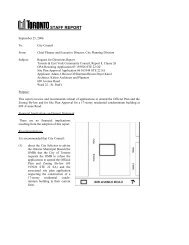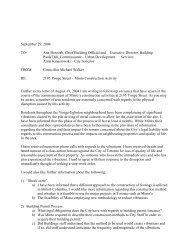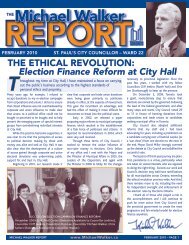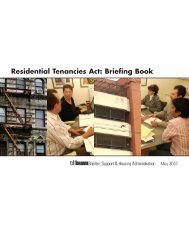Residential Tenancy Reform Consultation Paper
Residential Tenancy Reform Consultation Paper - Michael Walker
Residential Tenancy Reform Consultation Paper - Michael Walker
Create successful ePaper yourself
Turn your PDF publications into a flip-book with our unique Google optimized e-Paper software.
RESIDENTIAL TENANCY REFORM CONSULTATION PAPER<br />
B. Landlords should have to tell the new tenants<br />
what the previous rent was.<br />
This could be done by requiring landlords to give new<br />
tenants a copy of the last notice of rent increase (NORI)<br />
they gave to the previous tenant, or the prior lease, or<br />
some other stipulated legal document.<br />
If a tenant believes their rent is unlawful, they would be<br />
able to use this information as written evidence in making<br />
an application to the Ontario Rental Housing (the Tribunal).<br />
A penalty could be imposed if the landlord did not comply<br />
with the requirement to give tenants this information. For<br />
example, the tenant could be permitted to withhold rent<br />
until the landlord provides this information.<br />
If combined with options A or B from question 1 (no rent<br />
increase or only guideline increase allowed) this process<br />
would be relatively easy to administer, and both landlords<br />
and tenants could easily understand it. However, it would<br />
be more complicated for a landlord to demonstrate how<br />
catch-up increases they are charging (option C) are lawful.<br />
C. The provincial government should keep a list of the<br />
rent in every apartment and rental house that the<br />
new tenant can use to look up the previous rent.<br />
A third option is to require landlords to register their rents<br />
with the Tribunal. This would allow tenants to inquire<br />
about the lawful rent for their unit at the Tribunal and<br />
make an application if they believe that their rent is<br />
unlawful. It would be the landlord’s responsibility to provide<br />
rent information to the Tribunal, which would then<br />
need to be verified with the tenant. A penalty could apply<br />
to landlords who failed to provide this information.<br />
This type of system was in effect in Ontario from 1987 to<br />
1998. While it provided a way for many tenants and landlords<br />
to check lawful rents, it was very costly to maintain<br />
due to the volume of data to be collected, interpreted and<br />
verified. There were significant backlogs and delays with<br />
the verification of the data that was registered.<br />
A further consideration with this approach is how often<br />
landlords would be required to update this information.<br />
Under the previous registry system, the “maximum rent”<br />
(the rent charged on a starting date plus all allowable<br />
increases, whether or not the landlord had taken them)<br />
rather than the actual rent was tracked, which meant the<br />
landlord only had to register once. Currently, the concept<br />
of maximum rent does not apply to most units, and tracking<br />
actual rents would be extremely difficult to implement<br />
and enforce.<br />
4. Should any class of rental accommodation be<br />
exempt from regulation of new rents (e.g., smaller<br />
buildings or luxury apartments)?<br />
For some classes of rental housing, it may be less important<br />
to regulate the rents of new tenants.<br />
For example, buildings of fewer than four rental units<br />
could be exempted from restrictions on how much rent<br />
new tenants can be charged. This could mean that people<br />
with basement apartments could rent them out at whatever<br />
rent they choose once an existing tenant leaves (same<br />
as current situation). As small landlords are less likely to be<br />
professional property managers skilled at setting rents to<br />
maximize their income, this may be appropriate.<br />
On the other hand, the most affordable segment of the<br />
rental market tends to be the secondary rental market<br />
(rental units not specifically built for rental purposes). The<br />
secondary rental market includes basement apartments,<br />
duplexes and apartments over garages or stores. Demand<br />
typically outstrips supply in the most affordable segment<br />
of the rental market, which puts tenants at a disadvantage<br />
when negotiating rents with landlords.<br />
It could also be considered whether to regulate the starting<br />
rents for new tenants who move into luxury rental units.<br />
It could be argued that tenants who can afford higher-end<br />
rental have sufficient housing options and do not really<br />
need the protection of rent rules.<br />
6






